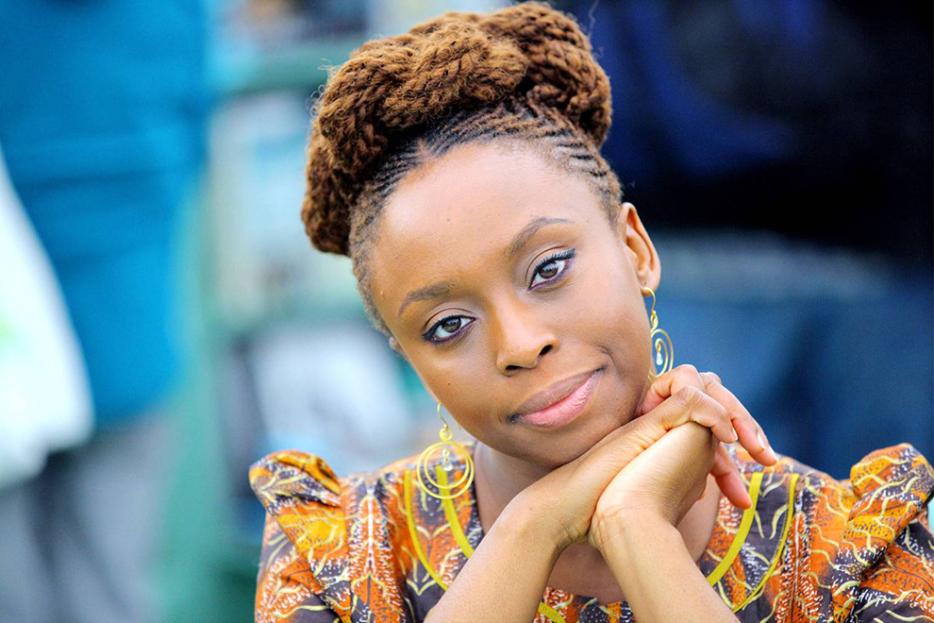Here are some things Chimamanda Ngozi Adichie doesn’t care for: baseball, the idea of African literature, designer heels, baseball, experimental fiction, summer blockbuster films, oh, and baseball. This is perhaps partly why the award-winning Nigerian writer’s latest novel Americanah opens and lingers lovingly on the topic of hair—black hair, to be specific.
“There are certain subjects that our culture has decided it is okay to do literary things with, but others—I suppose because we are not used to them in fiction—are remarkable,” says Adichie, sitting in the Hazlitt podcast studio in a Lagosian, tailor-made blue and white printed dress. She scoffs: “And so [people ask]: natural black hair, why? And I’m thinking, baseball, really? Why?”
Adichie has arrived in Toronto 11Hear Chimamanda Ngozi Adichie give her reaction to the alleged Rob Ford crack smoking video. after a quick trip to Harvard, where she met a young, dreadlocked graduate who proved her thesis. “She’s going to work in a fancy consulting firm and the first thing she said is, ‘Oh, I’ll cut my hair just before I start.’ So I said, ‘What do you mean?’ and she said, ‘The firm doesn’t really mind but the client won’t be comfortable.’ Adichie’s brow furrows here; it’s the unyielding look of bewilderment that comes with a lifetime of these slights. “It was the sadness of her acceptance. She really didn’t think to push back or question because she’s grown up in a world knowing there are times she can’t look like her authentic self. That’s the reality of the world and that’s what I wanted to write about.”
And so Americanah begins with Ifemelu, Adichie’s protagonist, trekking, grumbling and caustic but not unaware of herself, to an African hair salon in order to maintain her braided hairstyle. She takes the train from bougie Princeton—where she lives and works, on a fellowship—to nearby Trenton, because that’s where the black people, and their salons, are.
“Some people don’t think about it. I had a man say to me, ‘Oh you mean, Michelle Obama’s [straightened] hair doesn’t grow like that from her head?’ and I said, ‘No it doesn’t,’” says Adichie, who seems well-poised for these kinds of teachable moments. “So I said, ‘Next time you’re hiring somebody and she turns up and doesn’t have straight hair, don’t think that she’s some sort of crazy radical. Maybe she just doesn’t like chemicals in her hair.’”
Adichie is firm in her criticism but, like Ifem, who finds unexpected success as a blogger on race issues, she’s more bemused than militant. In one scene Ifem easily consents when a white woman asks to touch her Afro in line at the grocery store. The explanation she provides to a fuming partner: “How else will she know what hair like mine feels like? She probably doesn’t know any black people.”
That generosity is one of the hallmarks of the novel, a love story/bildungsroman steeped in cultural criticism. Americanah follows Ifem through girlhood in Lagos, university in Philadelphia, and an adult coming-of-age along the U.S. east coast until, after 13 years abroad, the election of Barack Obama, and her blog’s monetized success, she chooses to go home. Adichie parallels this with the story of Obinze, Ifem’s America-obsessed first love, who eventually makes it to England only to be chewed up and returned to Nigeria. The story takes a novelistic twist of fate when Ifem—now an “Americanah” adjusting to home—and Obinze fall prey to proximity. Americanah is, in many ways, a very normal story about longing, but it is an unusual novel about race.
“It was the sadness of her acceptance. She really didn’t think to push back or question because she’s grown up in a world knowing there are times she can’t look like her authentic self. That’s the reality of the world and that’s what I wanted to write about.”
“This is the obvious, unsubtle, un-nuanced, cinema verité novel about race,” says Adichie, laughing. Praise-filled reviews have turned peevish when considering Americanah’s central preoccupation, as if she hasn’t spoken publicly, virally, on similar themes. “The books and novels I’ve read about race didn’t satisfy me… it says something about the way no one is honest about race. It’s not that people aren’t thinking those things, it’s that they’re not saying them.”
Ifem and her blog serve as Adichie’s mouthpiece for these ideas. The fictional site has a sizable readership and a silly, intentionally obtuse name: “Raceteenth or Various Observations About American Blacks (Those Formerly Known as Negroes) by a Non-American Black.” Adichie, who is a traditional sort of writer, says the process of writing the blog posts was beyond her comfort zone. But it’s in those passages that Ifem, who sometimes floats through life, becomes a memorable protagonist. Some of Raceteenth’s sample headlines: “Obama Can Win Only If He Remains The Magic Negro,” “To My Fellow Non-American Blacks: In America, You Are Black, Baby,” and “What Academics Mean by White Privilege, or Yes It Sucks To be Poor and White but Try Being Poor and Non-White.”
For anyone who has spent even marginal time on blogs like Racialicious, the content of the posts are familiar. And Adichie’s ability to straight-talk renders the arguments convincing. “I had to prepare myself for sending these ideas out into the world, because I knew when I was writing it that I wasn’t following the rules,” she says, admitting that the task required some courage. “I got comments like, ‘maybe take out the blog posts,’ but I thought, no, I don’t want to. I realize there are people for whom this is not going to work, but that’s fine, because this is the book I wanted to write.”
It was written, she says, for everyone like her who wanted to read a different kind of novel on race, that wasn’t solely about race. “I wrote for women who want to see natural black hair in a novel. I wrote the book for people who leave home and want to see, in a novel, that idea of trying to figure out what home means and what going back means.”
Unlike Ifem, Adichie only spent four years in the U.S., for school, before returning home. (“It’s where I least question myself and my belonging.”) She describes herself as “a serious Naija girl,” and in certain cities in Africa she is somewhat of a celebrity. “Which,” she says, “basically means that sometimes people take my picture at the airport.” Widely read across the entire continent, her 2003 debut, Purple Hibiscus, is part of the secondary school curriculum in most of Anglophone West Africa.
“Growing up in Nigeria, writers weren’t exalted beings like they are in the West,” she says. “The Nigerian authors we read were much older, writing about realities that weren’t contemporary. Achebe, for example. Things Fall Apart, was set at the turn of the century and I thought many things in it were very exotic: why were these people eating pounded yam for breakfast?” Part of her mission, it seems, is to de-exotify Nigeria abroad, and at home. “I know that because of my work, young people see writing as something viable and I love that. I love that that’s happening, particularly with my Nigerian readership, because it’s their story I’m telling.”
Like the late Achebe, Adichie has populist tendencies. Her self-described “old-fashioned” tastes pull her toward novels, like Middlemarch, that take a stance or vibrate on some kind of universal frequency. Both Adichie and her protagonist have a sharp disdain for experimental fiction and existential musings (Adichie pokes fun at this: “Was this what the novelists meant by ennui?” a listless Ifem wonders after a break-up). When life outside of Nigeria begins to fail Obinze, he also loses hope in literature:
He read contemporary American fiction, because he hoped to find a resonance, a shaping of his longings, a sense of the America that he had imagined himself a part of. He wanted to know about day-to-day life in America, what people ate and what consumed them, what shamed them and what attracted them, but he read novel after novel and was disappointed: nothing was grave, nothing serious, nothing urgent, and most dissolved into ironic nothingness.
Like her takedown of race, Adichie offers a social critique on the way some contemporary fiction is divorced from the lived lives of salt-of-the-earth America. “I love books that are social in the way that they engage with the real reality. Experimental fiction… you know, there’s a sort of trendiness in these stories, there’s something lazy about them,” she explains. “If you don’t know how to tell a story, suddenly you start scrawling on the wall and all of a sudden it’s the new storytelling? I don’t have the patience [for those tricks]!”






